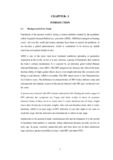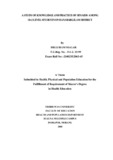Please use this identifier to cite or link to this item:
https://elibrary.tucl.edu.np/handle/123456789/3586| Title: | A Study of Knowledge and Practice of Hiv/Aids Among 10+2 Level Students on danabari, Ilam District |
| Authors: | Magar, Dilli Ram |
| Keywords: | HIV/AIDS;sex education;sexual Relation;Practice |
| Issue Date: | 2011 |
| Publisher: | Faculty of Education |
| Level: | Masters |
| Abstract: | The Study based on "knowledge and practice of HIV/AIDS among 10+2 level students on Danabari, VDC, Ilam." This study is mainly based on the primary data collected from Kankai Higher Secondary School on class 11 and 12 of Ilam District in 2011, which includes 120 adolescent students taken for a sample size by adopting simple random sampling method. The higher proportion of respondents is 17 years of age 87 percent respondents are unmarried, 44 percent respondents parents are engaged in agricultural based occupation more than 70 percent respondents are Hindu, the family size of the respondents 64.16 percent have between (5-10) members. Only 33.35 percent of the respondents fathers have primary level education. Almost all respondents have heard about HIV/AIDS. 83 percent respondents have the main sources of information is radio and 55 percent respondents said that unprotected sex is the main route of transmission of HIV/AIDS. 68 percent respondents said that not having sex with multiple can prevent transmission of HIV/AIDS. 67 percent respondents a person having HIV/AIDS would certainly die and 81.66 percent respondents is possible to have HIV/AIDS virus in a healthy looking person. 75 percent respondents gave positive resonance to HIV/AIDS infected people Almost 88 percent respondents HIV/AIDS is a burning social problems. It includes that most of the 95 percent respondents having necessary knowledge of HIV/AIDS for people and 93 percent respondents realize that they have importance of giving sex education to their children. 71 percent respondents said that it is not curable disease. 42 percent respondents said that they have used condom during sexual contact and 45 percent respondents to have to stop pregnancy for use condom. 36 percent respondents said that they suggest that sex without condom. |
| URI: | http://elibrary.tucl.edu.np/handle/123456789/3586 |
| Appears in Collections: | Health Education |
Files in This Item:
| File | Description | Size | Format | |
|---|---|---|---|---|
| chapter.pdf | 218.22 kB | Adobe PDF |  View/Open | |
| cover.pdf | 26.41 kB | Adobe PDF |  View/Open |
Items in DSpace are protected by copyright, with all rights reserved, unless otherwise indicated.
